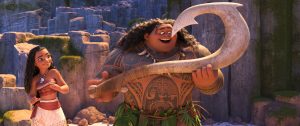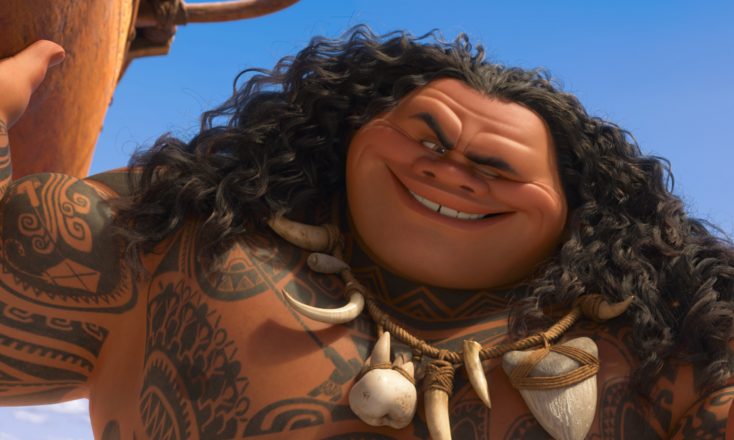
(l-r) Moana (voiced by Auli’i Cravalho) and Maui (voiced by Dwayne “the Rock” Johnson) in MOANA. ©2016 Disney. All Rights Reserved.
By ANGELA DAWSON
Front Row Features
HOLLYWOOD—Dwayne Johnson gives voice to a demigod named Maui in Disney’s colorful tropical animated adventure “Moana.”
The professional wrestler turned action and comedy star spent part of his youth in Hawaii and is Polynesian on his mother’s side. He says the Disney film was something he both eagerly anticipated and also was hopeful that the filmmakers would do justice to the Polynesian culture. The film centers on a teenage girl named Moana (newcomer AuIi’i Cravalho) who disobeys her father’s orders not to sail beyond the reef of their island to embark on a daring mission to return a magical stone to its rightful place on a far away island. She joins up with Maui (Johnson), who stole the stone centuries earlier to make humans admire him, so he is naturally reluctant to help Moana but eventually agrees to join her on her quest.
“Moana” presented Johnson with the opportunity to do something he really loves to do: sing. “Hamilton” creator/star Lin-Manuel Miranda and Pacific Island musician Opetaia Foa’i collaborated on the film’s catchy, island-inspired original songs along with Mark Mancina (Disney’s “Tarzan,” “Brother Bear”), who wrote the score. One of the highlights for Johnson is singing an upbeat solo called “You’re Welcome.”
The muscular bald actor plays a muscular—and very tattooed—demigod with a full head of hair and plenty of attitude on screen. At a press conference, Johnson, a father of two daughters, spoke about voicing Maui and what it means to be part of a Disney film that depicts his Polynesian culture.
Q: How do you feel about your culture being depicted in “Moana?” You and you’re your co-star Auli’i Cavalho are both Polynesian.
Johnson: The “Aloha Spirit” is something that is very special. It’s very meaningful to us and our Polynesian culture and so. For example, those of you who have had the opportunity to visit Hawaii or any of the Polynesian islands, it’s a very special thing. It’s an intangible. When you get off the plane and you have your feet on the ground (in Hawaii), it takes you to a different place. That’s the Aloha Spirit. And, you know, the opportunity that we had, just as Polynesians to be part of a story and to bring to life a story of our Polynesian culture in this capacity with our great partners at Disney, musically with these masters, was just a really, really special opportunity for us.
Q: How did you work together specifically on You’re Welcome to figure out what Dwayne’s vocal range would be for that song?
Johnson: It was an opportunity to… to challenge myself. Lin-Manuel (Miranda) did his research and by the time I got the song, it was in my comfortable range as well and then also parts of the song which pushed me a little bit, which I appreciate because that’s what I needed vocally as well and I had, honestly, I had such a great time, one of the best times I’ve ever had in my career was actually working on this project and certainly working on that song because also like we all love challenges and this was a challenge that the bar is set so incredibly high in a Disney film to sing, like historically.
Q: Co-director Ron Clements called you the new Angela Lansbury (who voiced Mrs. Potts in Disney’s animated “Beauty and the Beast’)
Johnson: Yes. Yes, I am. Proudly!
Q: One of the songwriters on this film is legendary Pacific Islander performer Opetaia Foa’i, whose job was to ensure authenticity of the music. Being that you and he are Polynesian, what do you hope that our people will take out from watching “Moana?”
Johnson: I think Opetaia is slightly older than me, maybe by just a few months. There is in our culture respect, which is very big. Pride is very big too, so that was very resonant in the pride that they will have in the film. So there was some hesitance from a lot of people in our culture about well, what’s going to happen if our culture’s going to be showcased for the very first time on this level, this capacity, from Disney? What’s going to happen? I can tell you with great confidence and this is my hope, too, as well, that our experience has been we were in such great hands. Anyone who knows (Disney creative chief and “Moana” executive producer) John Lasseter knows that he has manna in his soul and in his body. This was a very important project to him, which is why he sent the (directors Ron Clements and John Musker) on this mission for the past five years to do all the research. So I feel like the Polynesian people are going to be incredibly proud of the movie.
What’s going to touch upon all of us—regardless of where we’re at in the world, where we’re from, cultures, class, religion—is the voice. In our world today, it’s so relevant in this moment that is so full of noise. There’s so much noise that’s happening in our world, but the little voice that you’ve always got to listen to, your gut, your intuition, you can do things, you can go beyond boundaries and you have to trust that gut and instinct. Those are the things I feel like our people are going to take away and the rest of the world will take away.
Q: What would want audiences to take away from seeing “Moana?” What moved you the most?
Johnson: In life we get an opportunity to do some cool things, we hope, you know and things that are fun and that we like doing and, but with something like this, as Lin had said, you know, he was so moved. I was so moved when I saw the movie, for a variety of reasons, not only you work on it, you pour your heart and soul into it, it’s culture. Moana’s grandmother in the movie, Gramma Tala, is like my grandmother, and like so many of our grandmothers. I think that when I saw it in a theater, a very little theater, with a group of people, what I noticed and I’ve used this term earlier, is, there was just, they were floating when people walked out of the theater. It was such a cool thing to be a part of and to watch them come out and energetically they’re floating and also, too, I, in my entire career, I’ve never cried consistently through a movie. Ever! It was a very, very special thing, so yeah probably the biggest thing for me was just to watch everybody walk out (of the theater at the end) floating. That was cool.





